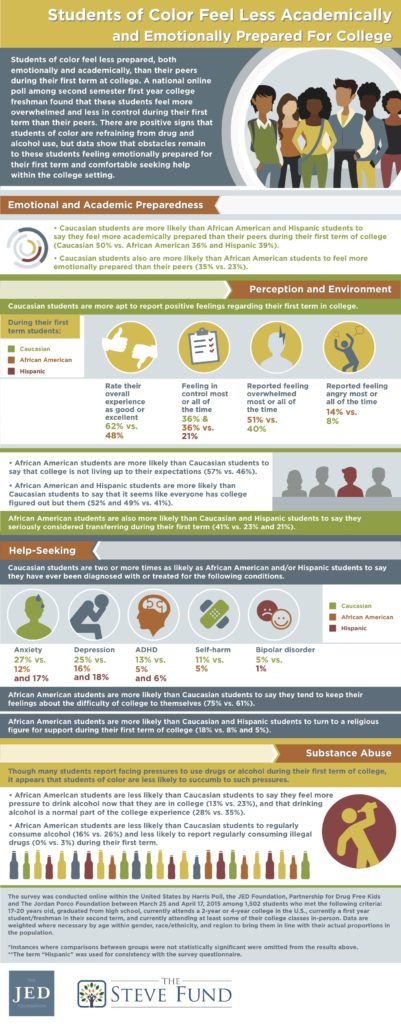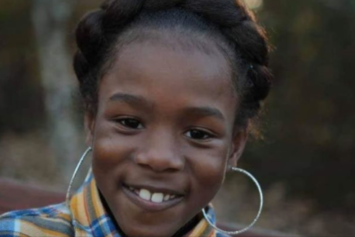
group of happy college students looking back
A new study reveals that Black adolescents experience more stress due to poor sleep, which leads to academic, behavioral and health issues. The findings are significant, as mental health is an issue seldom discussed or addressed in the Black community. Further, the effects of our social environment on Black mental well being — including racism, white supremacy, violence and the like — are often ignored and rarely examined.
This study, conducted by the University of Alabama at Birmingham, focused on teens. Previous research has been conducted on just children and adults. Other studies had proved that sleep problems and insufficient sleep can result in issues related to cognitive and physical health, due to the the hypothalamic-pituitary-adrenal axis. The HPA axis is the part of the neuroendocrine system that regulates the body’s reaction to stress and many other body processes. And examining adolescents is crucial because their sleep patterns and the HPA axis undergo a great deal of development during this period in their lives.
The research focused on sleep duration and sleep problems, as well as the impact of social stress on levels of cortisol, known as the “stress hormone.” Interestingly, the authors decided to focus on Black teens.
“We chose to look at sleep patterns in urban African-American adolescents, due to information we understood from earlier research in the field,” said Sylvie Mrug, a psychology professor at UAB, who conducted the research with other colleagues from UAB and Arizona State University. “This particular population is more likely to experience insufficient sleep, and their functioning is more negatively affected by lower sleep quality, so we knew that finding results for this demographic could be especially important.”
“The result of higher cortisol levels in adolescents experiencing sleep problems was exactly what we expected to see,” Mrug said. “We were, however, surprised that longer sleep duration predicted a stronger cortisol response, because previous studies linked shorter sleep duration with higher cortisol levels. Generally, less sleep is related to poor outcomes, not the other way around. In this case, this unexpected result could be explained by considering that longer sleep duration does not necessarily reflect higher-quality sleep, but instead may serve as another indicator of sleep problems, at least among urban adolescents.”
“Overall, the results of our study confirm what we originally hypothesized — that sleep problems induce greater response to stress in adolescents,” Mrug said. “It’s important that we know this, because the enhanced and prolonged activation of the HPA axis in response to stress could contribute to more health problems. The urban African-American youth whom we studied may be particularly negatively affected by poor sleep because they are more likely to experience uncontrollable stress related to community and school violence. We want to do all that we can to understand ways we can help ensure better cognitive, emotional and physical health outcomes for these adolescents.”

In recent months, much attention has been paid to the struggles of Black college students, particularly those at white colleges and universities, as they protest against the discrimination, harassment and lack of institutional support they face and seek to reform systems of racial oppression. A survey commissioned by the Jed Foundation and the Steve Fund found a clear disparity in the challenges faced by African-American college students and the lack of help they seek in addressing mental health concerns. The Steve Fund — named after Black Harvard graduate Stephen C. Rose, 29, who committed suicide in 2014 — is dedicated to supporting the mental health concerns of college students of color.
As was reported in the Chronicle of Higher Education, Black students feel less emotionally prepared for college and are more likely not to express their worries with others. The survey, conducted by the Harris Poll with 1,500 second-semester freshmen, found that less than half of black students rated their college experience as “good” or “excellent,” as opposed to nearly two-thirds of white students. Further, Black students were more likely to express feelings of anger and being overwhelmed, or that school was not living up to their expectations. In addition, Black students were nearly twice as likely to say they considered transferring during their first semester.
Further, white students were almost twice as likely to report a diagnosis of anxiety, depression or attention-deficit hyperactivity disorder, as three-quarters of Black students responded that they kept their feelings about the challenges they faced to themselves. Therefore, Black students, who have unique challenges related to stress and mental health challenges on predominantly white college campuses, are not receiving the help they need. For African-American and Latino students at white institutions, being underrepresented and in small numbers creates unique racial stressors. As a result, they use different coping mechanisms. For example, the study revealed that Black students were more likely to turn to a member of the clergy for support. However, Black students were less likely than their white peers to feel pressure to drink alcohol now that they are in college.
As the Wall Street Journal recently reported, students of color need more alternatives for mental health support. Blacks, Latinos and others are more likely to wait longer before seeking help, and they are also more likely to quit treatment. But if they receive good care, they have favorable outcomes that are comparable to those of white students. In February, the Steve Fund is launching an innovative pilot program to provide online emotional support to students of color. The service, called YPoC@7Cups (“Young People of Color @ 7Cups), is a platform for students of color who seek emotional support, and volunteers who want to provide that support.


